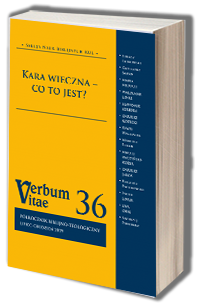Αἰώνιος w literaturze helleńskiej: od Platona do Pseudo-Timajosa
The αἰώνιος in Hellenic Literature: From Plato to Pseudo-Timaeus
Author(s): Ewa OsekSubject(s): Theology and Religion
Published by: Katolicki Uniwersytet Lubelski Jana Pawła II - Wydział Teologii
Keywords: αἰώνιος; semantics; ancient Greek literature; Classical period (510-323 BCE); Hellenistic period (323-31 BCE)
Summary/Abstract: A subject of this article is the semantic analysis of the Greek word αἰώνιος in Hellenic literature from its beginning to the composition of the New Testament. For the first time, the word αἰώνιος occurred in Plato’s Republic, and after Plato the term was re-used by the ancient Greek philosophers, poets, and historians. Part one of the paper shows the etymology of the αἰώνιος, part two discusses the semantics of the word in Plato’s dialogues, part three – its meaning in the post-Platonic philosophy, part four – in the Hellenistic poetry, part five – in the Hellenistic historiography. Part six contains an overview of entries in the Byzantine lexicons that refer to αἰώνιος. The semantic analysis of the αἰώνιος usus in the ancient Greek literature (4th c. BCE – 1st c. CE) leads to the conclusion that the term in any given context does not denote what is really eternal, i.e. without beginning or end, but something else: longeval, long-lasting, perennial, perpetual, endless, unceasing, imperishable, immutable. Among 60 occurrences only eight refer to eschatological punishments in Hades and three different concern eschatological rewards. None of them is about punishments or rewards that would be actually endless, but rather the long-lasting ones.
Journal: Verbum Vitae
- Issue Year: 2019
- Issue No: 36
- Page Range: 373-407
- Page Count: 35
- Language: Polish

